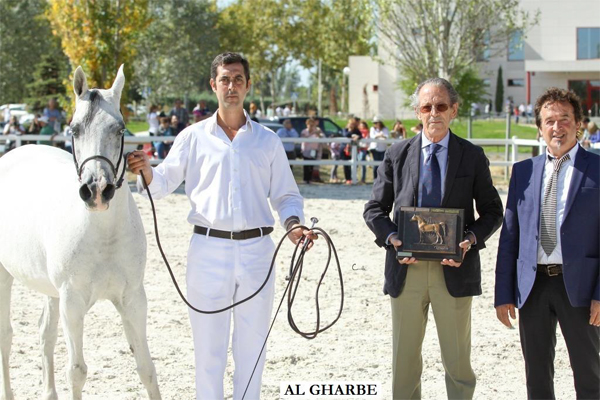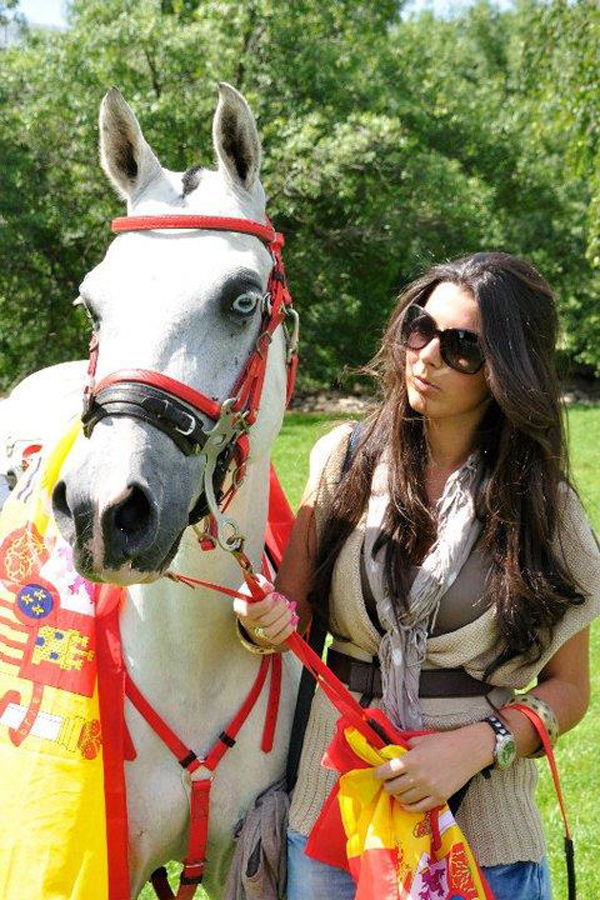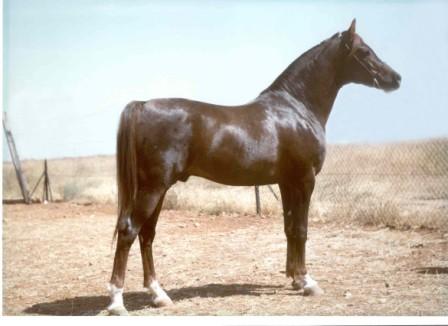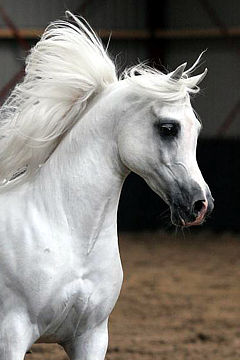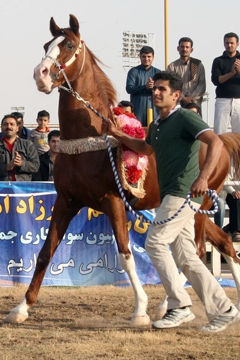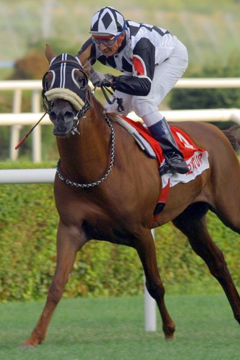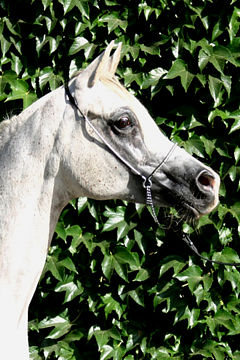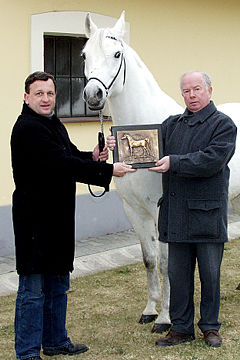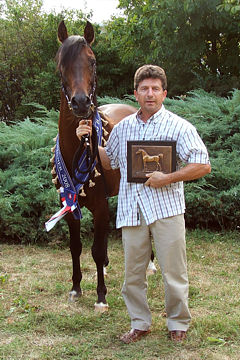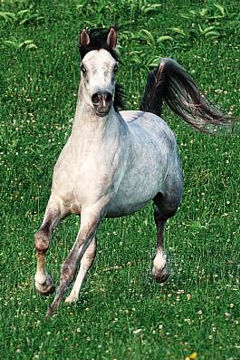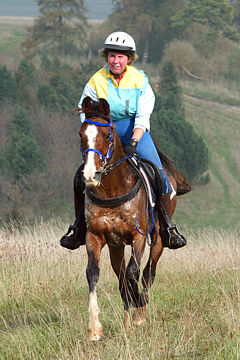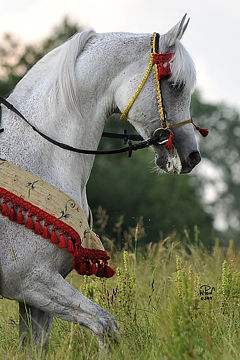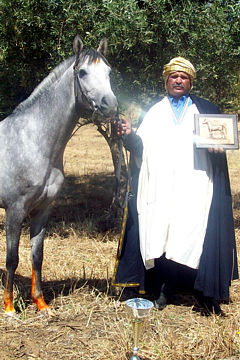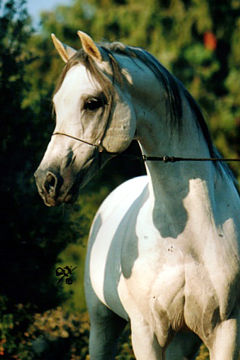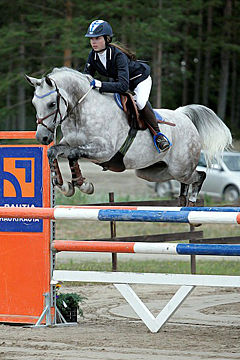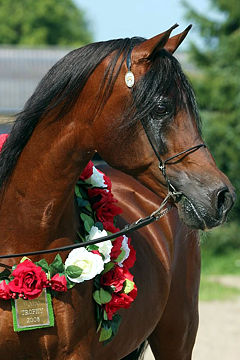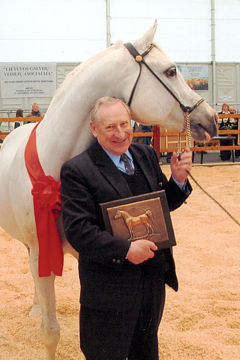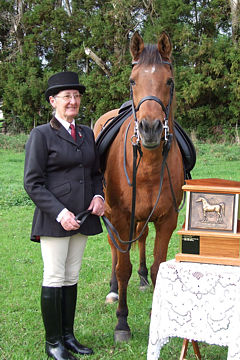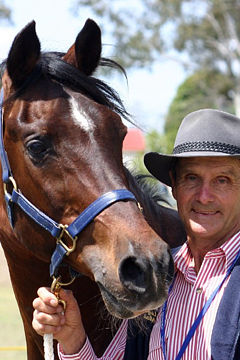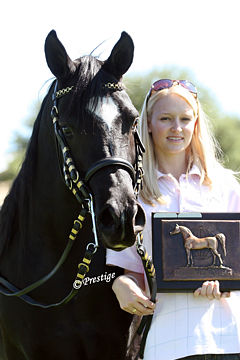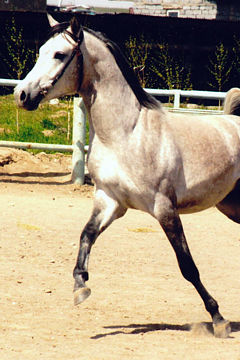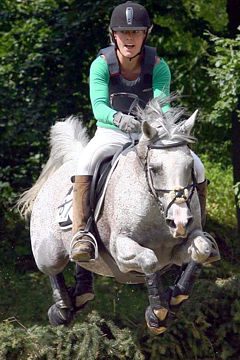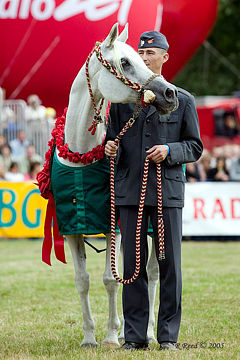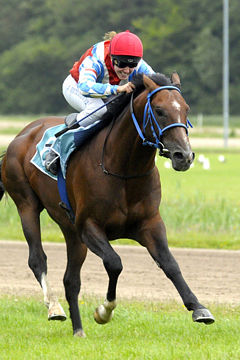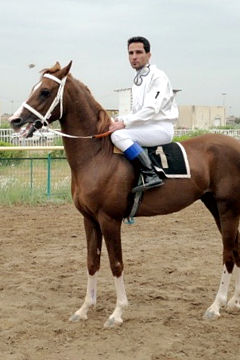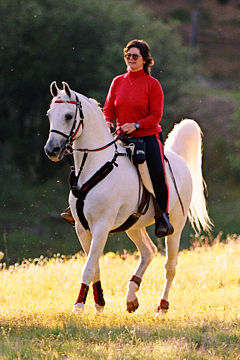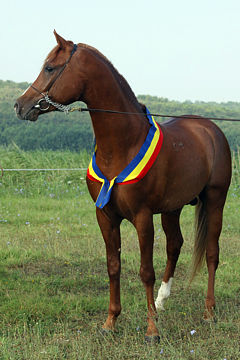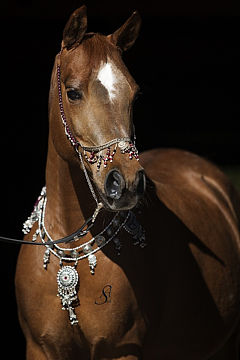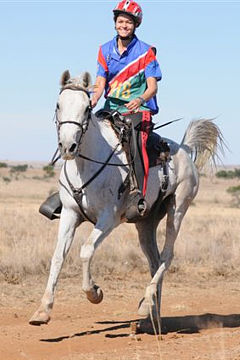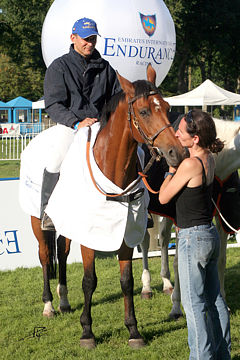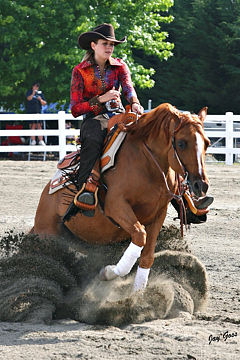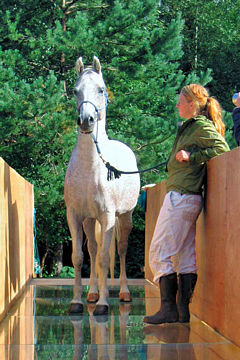![]()
Member Report from Spain
REPORT MADE AT THE 2019 WAHO CONFERENCE:
Jose Ramon Irigoyen, Spain: Good afternoon, President, Executive Committee and Delegates. My name is Jose Ramon Irigoyen and I am the President of the Spanish Breeders Association. First of all, I would like to thank the Australian Society for their fantastic welcome as well as for their perfect organisation of this Conference.
Secondly, I have to say our country continues along the same lines as previous years, looking for quality, beauty and functionality. The number of foals born each year is approximately 450 and the total number of Arabian horses in our country is 7,400. About the selection and improvement of young horses, we continue to develop in collaboration with the Agricultural Ministry a programme that includes sports prospects and genetic selection. 180 young horses participated last year.
Many breeders are turning their attention to producing Arabian horses with aptitude for endurance, their horses are competing successfully during the last years both in Spain where we have around 12 rides annually, and also internationally including in the European and World Championships.
Finally this year we will celebrate our 40th National Championship Show in the historical and monumental city of Cordoba, in the Alcazar Gardens where lived the Umayyad Caliph one thousand years ago. Andalusia was the centre of Arabian horses in our country and has hosted the International Salon of Arabian horses as well as the first WAHO Arabian Horse International Congress and is the home of the National Studs, Yeguada Militar. Thank you very much for your attention. My most appreciative congratulations to the organisers of this magnificent event.
REPORT MADE AT 2017 WAHO CONFERENCE:
Jose Ramon Irigoyen, Spain: Good afternoon, thank you very much everybody for the fantastic organisation of this meeting. My name is Jose Ramon Irigoyen, I am the President of the Spanish Arabian Horse Breeders Association.
I am pleased to tell you that this year we are going to publish volume 48 of our National Studbook, that covers the period from 2011 to 2014. We are working now on the next volume. About the total number of Arabian horses in Spain, this is estimated to be around 7,200. The number of foals that were registered last year was 540. Our horses are participating at the most high level in endurance really, really successfully. In the promotional level we are organising, with the support of the government, more than 10 shows, with more than 100 horses participating in them.
Regarding embryo transfer, currently in Spain two embryo transfers are permitted per mare each year. Finally, the famous endurance horse Al Gharbe was the winner of the WAHO trophy last year and I will soon send all the details to the WAHO Office. This is all, thank you very much for your attention.
REPORT MADE AT 2014 WAHO CONFERENCE:
José Ramon Irigoyen, Spain: Good afternoon. My name is José Ramon Irigoyen, I am a founder member of the Spanish Arabian Association AECCA and a member of their Executive Committee. As delegate to this Conference, I am speaking on behalf of Mr. Santiago Fernandez Bermejo, head of the Spanish Registry of Arabian Horses. First of all may we take this opportunity to thank our hosts, the Qatar Racing and Equestrian Club, for their hospitality. We are looking forward to all the interesting activities which have been arranged during the WAHO Conference.
The publication of the Spanish Arabian Stud Book Volume 47 was realized in 2014, covering the years 2007 to 2010. We sent out a copy of our Volume 47 consisting of 3 volumes, during this meeting members of WAHO were handed a flash drive with our volume. The next stud book will be published in 2015.
All horses are microchipped with a microchip of 23 digits in which are included the numerical codes for the country, breed and region where the horse was born. We continue to allow Artificial Insemination. We also allow Embryo Transfer, with a limit of two foals per mare per year. The estimated number of mares in our country is currently 6,700. The estimated number of stallions in our stands at 6,150. The number of foals registered in 2012 was 477, this dropped to 394 in 2013. We believe the reason for the decline is that our breeders are finding it harder to sell their young horses due to the existing economic climate and recession, so they are cutting back on breeding. The number of horses imported during the period 2012 to 2013 was 65 and the number of horses exported during the same period was 85.
During the years 2012 and 2013, a total of 13 championship shows were held in Spain, which included both halter and ridden classes, some of them also include showjumping and dressage competitions, with a total of 486 horses participating. Spanish Arabians are well known to be particularly talented at both showjumping and dressage and these are popular activities for the breed in our country. With regard to Endurance, in the same period 8 national endurance events in Spain were held with a total of 165 Arabian horses participating in these events. For several years, Spanish Arabians have been extremely successful in international endurance competitions.
Our Stud Book effectively promotes the world of Arabian horses in Spain. Seminars are held, and the Ministry along with the University of Cordoba has conducted a study on the improvement of the Arab breed, we also carry out improvement tests for young race horses. As for the WAHO Trophy, our policy is to continue to promote the existence of this award which we believe is important. All our previous winners so far have been stallions used for breeding, these include Zacateco and his two sons Fakateko and Fiolek, and also the talented dressage stallion Gual Xirac.
Our Stud Book has a database where anyone interested can go and look up the pedigrees and more information about our Arabian horses. An additional feature is for the calculation of consanguinity or inbreeding, our database does this automatically and takes into account all the genealogy of the horses not only from their parents but also from their ancestors. The website address is www.aecca.com.
Finally we would like to express our gratitude to our hosts, the Qatar Racing and Equestrian Club, for their generous hospitality. Thank you for your attention.
REPORT MADE AT 2011 WAHO CONFERENCE:
Marieta Salas, Spain: Good morning. I am Marieta Salas, I am representing the Spanish Arabian Horse Association, AECCA, and next to me as my co-delegate is Mr. Santiago Fernandez Bermejo, who is responsible for our Registry. This Registry used to be held by the Military Stud, but since 3 years ago it has been the Spanish Arabian Association that is responsible for this registry. I would like first of all to thank our hosts in Qatar for this wonderful WAHO Conference which we will certainly enjoy very much.
The publication of the Stud Book Volume 46, which includes the years 2007 to 2010 will be published at the end of this month and will be forwarded to all the country members of WAHO in a diskette, in addition a certain amount of books will be printed for anyone who wants to have it as a book, they can ask for this and it will also be sent to the official organizations. Since 2009, passports are being made under the guidelines of the European Community.
All horses entered since the AECCA took over the Stud Book in 2008 are registered with the UELN. All horses are microchipped with a microchip of 23 digits in which appear the country code, breed, and region where the horse is born. The Molecular Genetics Laboratory is in Algete, Madrid, this is where all the DNA tests are done, before with blood and now they will be done with hair samples. The estimated number of Arabian mares in our country is 7,118 and the estimated number of male Arabians is 6,665. The number of colts and fillies registered in 2009 was 570, and in 2010 was 650. The number of horses imported in the two years 2009 and 2010 together was 82, and the number of horses exported during the same period was 122.
In Spain, during the years 2009 and 2010 a total of 22 championship shows were held with a total of 857 horses participating. In regards to Endurance, 8 national events in Spain were held in 2009 and 6 in 2010, with a total amount of 210 Arabian horses participating in these events. Most of these endurance events take place during the winter months and these horses run over 120 kilometres. The Arabian is now being very successfully used for the betterment of other breeds such as the Andalusian, and this cross is called the Hispano-Arabe and this horse is becoming very, very popular in Spain for family riding and some small shows are held for them as well. Also, the Arabian is used in Anglo-Arab breeding. This concludes my report. Thank you very much.
REPORT MADE AT 2009 WAHO CONFERENCE:
Good afternoon, I am Marieta Salas, representing Spain. Together with me is Lieutenant Santiago Bermejo, he is the Registrar responsible for the stud book in Spain. As of the 2nd January 2008, the Spanish Arabian Breeders Association (AECCA) has taken the management of the Spanish Stud Book for Arabian horses, by an edict of the Ministry of Agriculture, due to the termination of the services related to the Stud Books of all breeds of 31st December 2007, from the Fondo de Explotación de los Servicios de Cría Caballar. These functions are presently being carried out by the Central Veterinary Laboratory in Algete, Madrid under the Ministry of Agriculture. This laboratory is able to determine DNA using 18 genetic parameters.
Spain is one of the countries with the oldest Arabian stud books in the world. There has been no new stud book published since number 45, which was published by the Ministry of Defence, but they will not be producing any more volumes. The Spanish Arabian Breeders Association will publish the next volume, next year.
There were 650 Arabian foals registered in 2008. During that year, 39 horses were imported and 29 were exported. We estimate the number of purebred Arabian horses living in Spain today to be 12,000, with 5,062 mares, 4,715 stallions and about 2,200 young-stock under three years of age. Our horses are now microchipped, they are DNA typed and they all have passports. As of 1st January 2009, the Association decided that the rules for Embryo Transfer should be revised, so from now on only 2 foals per mare will be permitted to be registered in the same year.
In Spain our Arabian horses compete mostly in halter classes and endurance. We also have showjumping, dressage and 3-day eventing, due to their athletic ability and their very kind natures. There were 12 halter shows held in 2008 with a good number of horses participating from all parts of Spain. AECCA is also working in conjunction with the Ministry of Agriculture and the Veterinary Faculty of Cordoba University in the study and selection of endurance horses, specifically towards the evaluation of young animals in order to find out their aptitudes in this field. 9 endurance competitions were organized in 2008.
Since 2005 the WAHO Trophy has aroused the interest of the breeders throughout Spain, encouraging them to enter their horses in sports competitions as well as in halter and to concentrate on improving our Straight Spanish lines, as well as those crossed with Straight Spanish. Thank you.
REPORT MADE AT 2007 WAHO CONFERENCE:
Spain is one of the oldest stud books in the world, since 1883 we have been registering all the pure Arabians born in Spain and those imported from other countries. At the beginning, they were from Russia, Turkey, Syria and Egypt. Then we imported horses from other countries, such as France and Argentina. One of our goals was the keeping of the desert lines and supporting the breeders of this beautiful horse. The rest of our history is like other countries, with the care and the confidence in this breed of horse. In 1972, Spain was one of the WAHO founder members and today is very proud of our contribution to this big Organization.
Now, some figures for Spain. Today we have about 12,620 registered Arabians, of which 1,130 mares are used for breeding and 600 breeding stallions. We have registered 770 foals in 2006, so we have seen a slight increase. Our last Stud Book is volume 44, which contains the 2001 to 2003 production.
We exported 17 horses and imported 48 in 2006. In the year 2000 we began with the DNA system, and parent verification is compulsory before registration. Spain was one of the pioneers in the use of microchipping, as an additional help in the identification of horses, and now we have about 60,000 microchipped in all breeds.
The most popular activities for Arabian horses are the shows, we have 8 shows to ECAHO level. Endurance is also more and more popular, this has improved and increased a lot in the last few years and in 2006 there were 70 endurance competitions held in Spain. As we all know the Arabian breed excels at this sport and Spanish Arabians are no exception, the Spanish team and individual riders have also competed successfully in international competitions over the past few years.
In 2007, Spain registered 747 foals. 11 horses were exported, and 35 were imported.

